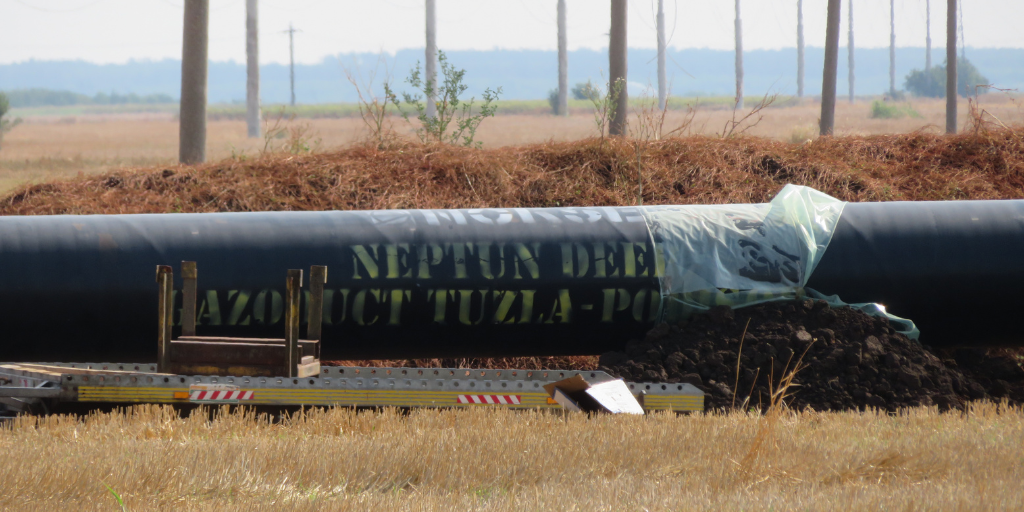‘Gas hub’ is Europe’s buzzword du jour, and the Romanian government certainly has high ambitions. With shiny new pipelines and a massive drilling rig in the Black Sea, Bucharest is working hard to capitalise on its neighbours’ fossil gas addiction – and to hell with the EU’s climate commitments. Even due process has been little more than an afterthought. Until this week.
Raluca Petcu, Gas campaigner | 27 February 2025

On Monday 24 February, campaigners from the environmental non-governmental organisation Bankwatch Romania, a Bankwatch member group, filed a lawsuit against Romania’s energy ministry and Transgaz, the national gas grid operator, over significant irregularities in issuing permits for the construction of the Tuzla–Podișor gas pipeline.
The 308-kilometre pipeline – meant to connect the planned Neptun Deep offshore gas drilling project in the Black Sea with Romania’s grid – is currently being built with a deficient environmental permit and without a valid construction permit.
The original construction permit, issued in 2018, expired in 2021. Romania’s energy ministry had failed to renew the permit in due time and Transgaz commenced works on the pipeline in 2023 without a valid permit, the lawsuit argues.
There is also an insufficiently evaluated risk that the project could take a heavy toll on biodiversity. The environmental impact assessment only evaluated the expected influence of the project on eight protected areas the pipeline would cut through. Yet, despite a legal requirement, it omitted five other protected areas located right next to the pipeline route.
In addition, the Romanian environmental authorities failed to conduct a transboundary environmental impact assessment, as legally required by the Espoo Convention and EU rules, despite the pipeline route coming within 10 kilometres of the Bulgarian border and undercrossing the Danube River.
The environmental impact assessment that Transgaz did produce for the Tuzla–Podișor pipeline does not include a proper assessment of the climate impact of its infrastructure. On the heels of the hottest year on record, the failure to account for the greenhouse gas emissions this pipeline is expected to generate is a glaring omission.
Starting in 2027, the pipeline is expected to ship an annual 8 billion cubic metres of fossil gas from the Black Sea coast to the BRUA gas pipeline, connecting Bulgaria, Romania, Hungary and Austria. A yet undisclosed share of this gas is expected to power the Oltenia and Mintia power plants, and Transgaz expects Romania’s fossil gas consumption to double from 2027, supported in part by the pipeline.
While there is no publicly available information about where all this gas will wind up, Romania’s ongoing discussions with Hungary, its recent deal with Germany’s Uniper, and a memorandum of understanding signed with Serbia on a BRUA-linked gas interconnector indicate that some of it is intended for export.
The bottom line, though, is that the Tuzla–Podișor pipeline project is fundamentally at odds with Europe’s energy transition. The planned Neptun Deep project, which the pipeline is meant to serve, is run by OMV Petrom and Romania’s state-owned Romgaz. They claim that it could produce about 100 billion cubic metres of fossil gas over 20 years – right when Europe needs to slash its gas demand.
If these plans materialise, Neptun Deep and its associated pipeline infrastructure would be responsible for between 209 and 227 million tonnes of carbon dioxide equivalent, primarily from gas combustion, according to a 2024 report commissioned by Greenpeace Romania.
Alarmingly, the Tuzla–Podișor pipeline has received millions in EU funding. The project costs EUR 500 million, already around 35 per cent more than estimated seven years ago. And even though EU leaders have repeatedly vowed to phase out fossil-fuel subsidies, this gas project still received EUR 85 million from the Modernisation Fund in 2023, a key financial instrument designed to accelerate the shift away from fossil energy in Europe’s lower-income Member States. It also secured EUR 150 million from the European Investment Bank back in 2018.
Notably, this is not the first time the Modernisation Fund has been leveraged to support fossil gas projects, effectively subverting Europe’s energy transition. In Romania alone, a range of gas infrastructure projects were enabled by the Fund between 2021 and 2023, according to a Bankwatch analysis released last year. As of late 2024, the Fund has already channelled at least EUR 1.45 billion into fossil gas investments.
EU institutions – specifically the European Commission’s Directorate-General for Climate Action and the European Investment Bank – must avoid directing EU money to harmful projects. For this to be achieved, they must first ensure that prospective projects are subject to rigorous assessment in compliance with EU climate targets and the Paris Agreement. Meaningful due diligence is also required to bring them into alignment with these goals and all other applicable EU and national legal requirements. Had such scrutiny been applied to the Tuzla-Podișor pipeline, the project would never have seen the light of day.
Never miss an update
We expose the risks of international public finance and bring critical updates from the ground – straight to your inbox.
